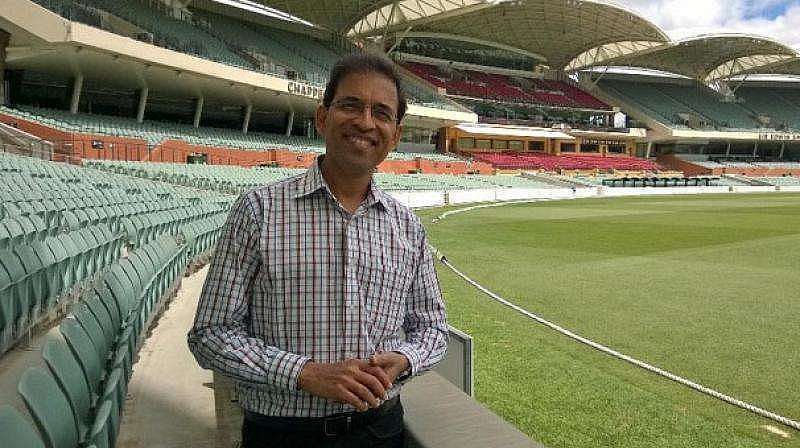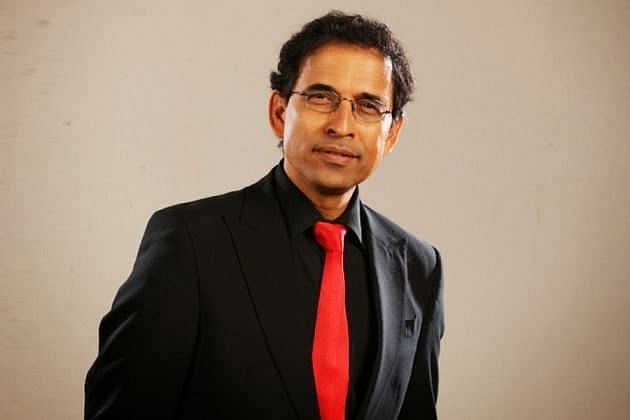
'If I had started commentary today, I wouldn't have got any match' - Harsha Bhogle

Renowned cricket commentator Harsha Bhogle has mentioned that he would not have got a chance to wield the mic had he started his broadcasting career now. He believes that the influx of former cricketers in the world of broadcasting in the present day would not have allowed him to get a break.
Harsha Bhogle shared details of his journey as a cricket commentator in an interaction on the YouTube show Cric Cast.
The Hyderabad-born Mumbaikar was asked how he had forayed into the world of commentary. Harsha Bhogle responded that he had shared a cassette of the commentary he had done during a university match that his team was playing, with All India Radio (Hyderabad).
"I had taken a cassette player for our match. I did commentary when our team openers were playing. Then gave it to All-India Radio. Hyderabad is a city, but it is a big village as everyone knows each other. I have it at the back of my mind, that my father had spoken to someone that his son will come and give a tape to him asking him to listen to it. So, I gave the tape to him."
Harsha Bhogle recalled that a professor at his university had helped him by getting the station director of AIR to listen to his commentary.
"But I was 18-19 years old, who gives an opportunity to such a young boy. The station director of AIR was Mr. Baweja who used to stay near a professor of our university, who got him to listen to my cassette."
Harsha Bhogle expressed gratitude to Mr. Baweja for having been given an opportunity to do radio commentary for a Ranji Trophy match when he was still a teenager.
"It was his greatness that he listened to the cassette and didn't say that I was 18-19 years old and to come after 2-3 years. So, I was only 19 years old when he allowed me to do commentary for a Ranji Trophy match."
Harsha Bhogle on his stint with ABC in 1991-92

Harsha Bhogle was then asked about his experience of working with the Australian Broadcasting Corporation (ABC) in 1991-92. He shared how reputed commentator and columnist Sharda Ugra had helped him to get a contact to reach out to.
"That was a distant thing. The first question was how should I reach the ABC. I didn't have any acquaintance there. I had a friend in Radio Australia, Sharda Ugra, who writes for Cricinfo now. So she gave me a name and I sent them a fax, there was no E-mail at that time."
Harsha Bhogle also talked about the double-cassette deck he had to buy from his family's savings to be able to send across his commentary samples to ABC.
"ABC asked me to send a sample of my commentary. But who had a sample. Luckily, my father had recorded some of my commentary from Duleep and Ranji Trophy matches. So, I recorded that into another cassette after buying a double-cassette deck from the savings of mine and my wife's first salary."
Harsha Bhogle revealed that although he got an opportunity after all the hardships, he was not paid for it.
"So, I sent that through registered post as courier was very expensive those days. They said that they will give me one Test match but not pay me as I was the visiting commentator and they didn't have budgets."
Harsha Bhogle disclosed that to fund his stint as a commentator, he used to write columns during the breaks for newspapers back home in India.
"So to do the commentary I used to write an article during lunchtime for the afternoon newspaper in India. For the end of the match, I used to write for a different newspaper. Those days I used to shoot for video magazines which came out every 15 days."
Harsha Bhogle also divulged that he used to write ghost columns for reputed cricketers like Richie Richardson, Mohammad Azharuddin and Allan Border.
"I also used to do ghost columns for Richie Richardson, Mohammad Azharuddin and Allan Border. I used to do all that as I didn't used to get money for my radio commentary. So, I was working for 12-13 hours a day but never got tired. You never get tired while watching cricket."
Harsha Bhogle was also asked how difficult it was to gain acceptance from cricketers who might have asked why he was talking about cricket rather than them. He replied that such questions are still being asked, while mentioning that there was no issue in radio commentary as the roles were demarcated.
"They still ask. It's not that they don't ask now. On radio it was easy, because they had a caller and an expert there. Caller would talk about what was happening in the match, while expert would tell why it was happening. When we came to television, then this question was being asked."
Harsha Bhogle acknowledged that he was lucky to have started doing television commentary when the cricketers had not joined the bandwagon, while also admitting that he may not have got a chance to do commentary had he forayed into the field now.
"I was fortunate that players had not come till then and I had the experience of Doordarshan. So, I got a chance before the players had come. If I had come today, I wouldn't have got any match."
Harsha Bhogle has been the voice of Indian cricket for more than three decades. Starting off his career as a radio commentator, he made a seamless transition into the world of television commentary and has gone to become one of the most-followed sports commentators across the globe.